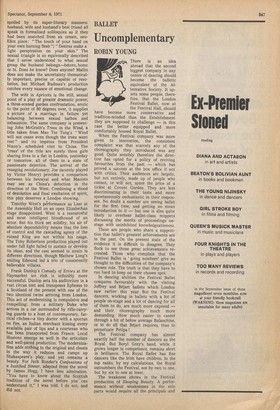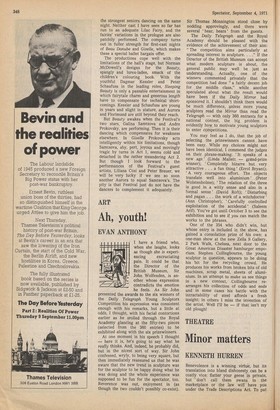Uncomplementary
ROBIN YOUNG
There is an idea abroad that the second biggest company in any centre of dancing should become the balletic equivalent of the Alternative Society. It upsets some people, therefore, that the London Festival Ballet, now at the Festival Hall, should have become more conservative and tradition-minded than the Establishment they are supposed to challenge — in this case the better equipped and more comfortably housed Royal Ballet.
When the Festival company was more given to innovation, the consistent complaint was that scarcely any of the choreography they introduced was any good. Quite sensibly therefore the direction has opted for a policy of reviving favourites from the past — which has proved a success at the box office if not with critics. Their audiences are largely, but not entirely, made up of people who cannot, or will not, spare the price of a ticket at Covent Garden. They are less discriminating in their taste and more spontaneously enthusiastic in their responses. No doubt a number are seeing ballet for the first time, and getting no mean introduction to it — but one is also quite likely to overhear ballet-class moppets discussing the merits of proceedings onstage with uninhibited knowledgeableness.
These are people who share a supposition that ballet's greatest achievements are in the past. On the present state of the evidence it is difficult to disagree. They flock to see those great achievements recreated. Those who complain that the Festival Ballet is 'going nowhere' give no thought to the difficulties of the company's chosen role. The truth is that they have to run hard to keep on their chosen spot.
In dancing abilities the Festival Ballet compares favourably with the visiting Joffrey and Mart ballets which London saw earlier this year. But the Festival dancers, working in ballets with a lot of people on-stage and a lot of dancing for all of them to do, are much more exposed — and their choreography much more demanding. How much easier to canter through a bit of below average Balanchine, or to do all that Mart requires, than to perpetuate Petipa !
The Festival company has almost exactly half the number of dancers as the Royal. But Beryl Grey's hand, while it grows longer in competence, remains short in brilliance. The Royal Ballet has fine dancers like the Irish have children. In the top ranks, by my calculations, the Royal outnumbers the Festival, not by two to one, but by six to one at least.
The weakness shows in the Festival production of Steeping Beauty. A performance without weaknesses in the solo parts would require all the principals and
the strongest seniors dancing on the same night. Neither cast I have seen so far has run to an adequate Lilac Fairy, and the fairies' variations in the prologue are also patchily performed. The company turns out in fuller strength for first-cast nights of Beau Danube and Giselle, which makes these a special ballet bargain offer.
The productions cope well with the limitations of the hall's stage, but Norman ,McDowell's designs for the Beauty, spangly and lurex-laden, smack of the children's colouring book. With the youthful Dagmar Kessler and Peter Schaufuss in the leading roles, Sleeping Beauty is only a passable entertainment in which fairytale charm and generous length have to compensate for technical shortcomings. Kessler and Schaufuss are young in years and slight in stature, and Aurora and Florimund are still beyond their reach.
But Beauty awakes when the Festival's two stars, Galina Samtsova and Andre Prokovsky, are performing. Then it is their dancing which compensates for weakness elsewhere. In Giselle Prokovsky acts intelligently within his limitations, though Samtsova, shy, pert, joyous and movingly tragic by turns in Act 1, seems cold and detached in the rather meandering Act 2. But though I look forward to the performances of the Festival's guest artists, Liliana Cosi and Peter Breuer, we will be very lucky if we see so soon another Aurora to equal Samtsova's. The pity is that Festival just do not have the dancers to complement it adequately.



































 Previous page
Previous page